Tick-tock, tick-tock, tick-tock…
We know the clock of human mortality is ticking. According to the World Death Rate, 172,824 will die today, 7,201 in the next hour, and 120 while you read these last couple sentences.
There are countless aspects of death, particularly what happens after, that we feel uncertain about. Let’s start with what we seem to know for sure:
This is a 100% mortality rate.
We deal with our mortality through denial.
You don’t bring up death at a dinner party.
Death effects everyone. Right? No one makes it out alive. According to the latest research, our angst about death impacts virtually everything we do. This isn’t a new discovery. William James, often credited as the founder of American psychology, stated that knowledge of the inevitability of death is the “worm at the core” of human experience. In other words, the knowledge of our own mortality fundamentally shapes human thought and behavior.
The idea that nearly everything we do individually and collectively is a response to death seems far-fetched. However, in the book The Worm at the Core: On the Role of Death in Life the evidence the authors present is compelling, and offers a convincing explanation to many otherwise intractable mysteries of human behavior.
Sheldon Solomon writes in The Worm at the Core:
“Although we typically take our cultural worldview for granted, it is actually a fragile human construction that people spend great energy creating, maintaining, and defending. Since we’re constantly on the brink of realizing that our existence is precarious, we cling to our culture’s governmental, educational, and religious institutions and rituals to buttress our view of human life as uniquely significant and eternal.”
The fact that we are going to die and know this is a unique psychological feature of Homo sapiens. In 1860, Scottish writer Alexander Smith suggested:
“It is our knowledge that we have to die that makes us human.”
Our society discourages dialogue about death and if you are someone who raises the issue, you may be considered morose and nihilistic. The top coping mechanism for death is denial. This does not remove the problem of death; it merely buries it. This can lead to a collective neuroticism, all in the service of creating an effective psychological barrier against reality.
I am committed to supporting people in cultivating existential health. In fact, I train EXiHealth Counselors to work with people in the throes of existential anxiety, nihilism, and a crisis of meaning. These are the lucky ones because they are confronting life at the deepest level. French philosopher Albert Camus wrote, “Face up to death. Thereafter anything is possible.”
My conviction, having devoted 25 years in my professional work with people in belief-system deconstruction and existential health, is that the foundation of individual, collective, societal and planetary flourishing is having a constructive relationship with the givens of human existence, which I identify as:
Human mortality (Life ends) - There will come a day when our life on earth as a Homo sapiens will end.
Human groundlessness (Life is meaning-less) - There is no inherent or absolute meaning to life, and we must determine meaning for ourselves.
Human insatiability (Life is lack) - We will never achieve a state of perfect happiness, fulfillment or completion.
Human loneliness (Life is solitary) - There will always be a dynamic for Homo sapiens in which we experience life as an isolated experience.
I have written extensively on the subject of the givens of human existence and existential health, most recently:
Accepting Death
My interest in writing this article is hoping to encourage us toward a healthy death acceptance.
I should probably be upfront about my conflicted feelings about death before proceeding with this article. Death has impacted my life personally in many ways. My grandparents, parents, and two siblings are no longer living. Each of those deaths is its own story, tragedy and heartache. My best friend in high school committed suicide, and my first college girlfriend was killed in a freak accident, racing her bike across railroad tracks in pouring rain. These losses were devastating.
Over the years, I have had to put down four beloved dogs and three cats. I’ve had two close brushes with death myself, both of which I should not have survived. One of them was a hit-and-run incident on a highway that involved fatalities. My vehicle was pulverized from behind by a drunk driver, sending my car into a roll down an embankment and crushing my vehicle. Using the Jaws of Death, I was miraculously pulled out alive. The other scenario was having heat stoke at the end of an ultramarathon competition in the mountains of Tennessee. I was rushed to a hospital unconscious and was told that had I arrived 15 minutes later I would have not survived. Both these experiences had a profound impact on my life.
As a pastor, I officiated countless funerals. For a season of my life, I traveled the world doing human rights work, specifically cases of forced child prostitution and child slave labor in Southeast Asia. I encountered death on multiple occasions in these endeavors. Brothel raids can often include fatalities. As a first responder chaplain I have been called to many tragic scenes with loss of life, including teen suicides.
In the most recent past, I was the primary and sole caregiver of an individual, dying from terminal cancer, which I discuss in this previous article. It was traumatic to witness and care for a person through the disturbing and heartbreaking stages of their physical, mental and psychological deterioration, and to be with them for their last breath. The initial impact of this was my hatred of death with an intensity I had never felt before.
“We all know death is wrong.”
I recently did a debate on the subject of death and the afterlife. I was identified as the “secular thinker” and the other person, the “Christian thinker.” There were many of his beliefs with which I disagreed, but one particular view he espoused during our debate stuck with me. He assumed that everyone would agree that death is a bad thing. From his particular Christian point of view, death was never part of God’s original and perfect plan. Death is essentially a curse, abomination, enemy and evil that God ultimately reverses, overcomes, and fixes.
During the debate he said, “We all know death is wrong.” This mindset is prevalent in our culture as a whole. We depict death as the “Grim Reaper”. In many mythologies, the Grim Reaper is the black-cloaked, scythe-wielding personification of death. He causes the victim’s death by coming to collect that person’s soul.
If you google “death” word clouds, you find this:
Notice the words: depression, evil, grief, dark, black, hell, broken, disaster, horror, murder, punishment, spooky, prison.
In contrast to the Grim Reaper, the idea of the “elixir of life” is a wishful antidote. The elixir of life (also known as “elixir of immortality"), is a potion that grants the drinker eternal life and/or eternal youth. We can’t leave out the “philosopher’s stone”, the mythic alchemical substance, useful for achieving immortality.
No one wants to die. There is a long and gruesome history of people seeking to live forever. People fight aging, dying and death as their last stand. In 1900, the average life expectancy was 32 years. It doubled to 71 years by 2021. In 2022, the CDC estimates life expectancy in the U.S. increased to 77.5 years. The global anti-aging market was estimated at $64 billion in 2022 and is expected to surpass $122 billion by 2032. Modern science pours its energies into medical advances to extend life. Some avenues for addressing the extension of life are controversial such as cryonics, and “augmented eternity”.
Is it true that “death is wrong”? If so, every human being’s life is wrong and cursed because life will end in death. We all die. Mortality always lurks in the background. Religion helps the medicine go down by offering compelling afterlife narratives, such as Heaven, which I discuss in two articles:
Death Anxiety
Death anxiety is anxiety caused by thoughts of one’s own death. This can be referred to as thanatophobia (fear of death). Individuals affected by this kind of anxiety experience challenges and adversities in many aspects of their lives.
Death anxiety impacts everyone. You might say, “Not me. I hardly think about death.” The reality is, consciously or unconsciously, death anxiety impacts all human beings at some level.
For better or worse, Homo sapiens developed the ability to think in abstract and symbolic ways. The upside of being able to think so deeply is we can know that we’re here and can reflect on our own existence. The downside: It also means we can reflect on our future and inevitable non-existence – i.e. the fact that we’re going to die. We manage our existential angst through the creation and maintenance of culture – all the things we tell ourselves and teach each other about the nature of reality. In my series on the anthropology of religion I discuss how Homo sapiens developed ways of coping with the givens of human existence. I also discuss this in my series on the psychology of religion.
Existential Psychotherapist, Irwin Yalom, has written extensively about death anxiety. He writes:
“It’s not easy to live every moment wholly aware of death. It’s like trying to stare the sun in the face: you can stand only so much of it. Because we cannot live frozen in fear, we generate methods to soften death’s terror. We project ourselves into the future through our children; we grow rich, famous, ever larger; we develop compulsive protective rituals; or we embrace an impregnable belief in an ultimate rescuer.”
“Despite the staunchest, most venerable defenses, we can never completely subdue death anxiety: it is always there, lurking in some hidden ravine of the mind.”
“Death, however, does itch. It itches all the time. It is always with us, scratching at some inner door. Mirroring, softly, barely audibly, just under the membrane of consciousness. Hidden in disguise, leaking out in a variety of symptoms. It is the wellspring of many of our worries, stresses, and conflicts.”
How much anxiety do you have around death? What follows is a Death Anxiety Questionnaire (DAQ). This is meant to help you access how much death anxiety may be influencing your life. You might be struggling with death anxiety if you answer ‘yes’ to most of these questions. As a caveat, when I took this questionnaire, it actually low-key stressed me out even more about death. But this might be because I overthink about everything, like how the Detroit Lions have never won a Super Bowl with players like Barry Sanders, Calvin Johnson and Chris Spielman. Anyhow, here’s the DAQ:
Do you spend a lot of time worrying about your death or the death of a loved one? Yes/No
Are you frightened about what happens after you die? Yes/No
Do you feel scared of what dying will be like? Yes/No
Are you very concerned about the suffering your death will cause others? Yes/No
Do distressing mental images about death or dying often pop into your mind? Yes/No
Does the idea of death or dying make you feel very sad or guilty? Yes/No
Have thoughts about death interfered with your relationships, work, or enjoyment of life? Yes/No
Do you avoid things that remind you about death, such as places (e.g., cemeteries or hospitals), people (e.g., health professionals), or types of entertainment (e.g., stories, TV shows, or films featuring death)? Yes/No
Have you often found yourself looking for information or seeking reassurance about your health, the health of others, or what happens after you die? Yes/No
Do you feel compelled to do things that might reduce the risk of dying (e.g., exercising excessively, checking for signs of illness or danger, or other repetitive ‘rituals’ that help you feel safe)? Yes/No
Have your concerns about death stopped you from doing important end-of-life tasks like preparing a will or discussing funeral preferences? Yes/No
How did you do?
Archaeologists have discovered that the concept of the afterlife and metaphysical beliefs surrounding death existed as early as the Paleolithic period, dating back 2.5 to 3 million years ago. The most pervasive strategy for managing and coping with death anxiety and the fear of death in our species has been denial. Though I cannot do justice to the evolution of death-awareness in our species, you can explore the topic of evolutionary thanatology, here.
Death anxiety impacts different people in different ways or levels of severity. For example, if you recently lost a loved one to death, anxiety around death may be more significant. Or if you by vocation are an emergency care giver, death anxiety might impact you in a way that might not others. Research shows that death anxiety is more pronounced in those who have suffered disaster-related loss.
More generally, in the development of almost any emotional dysfunction concerns of death have a significant impact. Our unique human capacity to reflect on our existence, anticipate our own demise, and imagine the horrible details of dying inevitably creates anxiety. Death awareness, no matter how vague, poses a constant threat and makes us uncomfortable because we can never escape from the long shadow of death.
Both cultures and individuals have developed elaborate mechanisms of death denials, such as religious beliefs and personal ambitions for success and happiness. The problem with these death-denying efforts is that no matter how hard we try to conceal and repress death, anxiety about our demise can still manifest itself in a variety of symptoms, such as worries, depression, stresses, and conflicts.
A few interesting distinctions about death anxiety are:
Women tend to be more afraid of death than men.
Young people are just as likely to experience death anxiety as elderly people.
No association has been found between religious engagement and reduced death anxiety.
People experience death anxiety in different ways. If you struggle with death anxiety, you might worry about:
The process of dying (“Dying will be painful.”)
What happens after dying (“What if I go to hell after I die?”)
The consequences of dying (“My death will make my family suffer.”)
Other people dying (“I won’t be able to cope when my partner dies.”)
Death overall (“Why is death so cruel and unfair?”)
Death anxiety has long been a subject of great interest in psychology, including the work of Freud and Jung. But it was the theory put forth by the anthropologist Ernest Becker that has informed most current understandings of death anxiety and its causes. Becker believed that death anxiety comes naturally to all people who find the thought of death and dying unacceptable. In 1974 he wrote the Pulitzer Prize-winning book, The Denial of Death. Becker’s striking claim is that human activity is driven largely by unconscious efforts to deny and transcend mortality.
Becker wrote some compelling thoughts about death and human mortality in his book. I’ll mention three:
(1)
“When we are young we are often puzzled by the fact that each person we admire seems to have a different version of what life ought to be, what a good man is, how to live, and so on. If we are especially sensitive it seems more than puzzling, it is disheartening. What most people usually do is to follow one person's ideas and then another’s depending on who looms largest on one's horizon at the time. The one with the deepest voice, the strongest appearance, the most authority and success, is usually the one who gets our momentary allegiance; and we try to pattern our ideals after him. But as life goes on we get a perspective on this and all these different versions of truth become a little pathetic. Each person thinks that he has the formula for triumphing over life's limitations and knows with authority what it means to be a man, and he usually tries to win a following for his particular patent. Today we know that people try so hard to win converts for their point of view because it is more than merely an outlook on life: it is an immortality formula.”
Becker’s point is that behind most of our seeking and searching through religion, spirituality, and therapeutic and self-help culture, we are unconsciously looking for an “immorality formula”. This is why the leaving-religion process can be volatile. For many people, “God” is their “immortality formula”. When one loses faith in the “God” of their religion (including the theological and existential scaffolding upon which that “God” is constructed), an existential crisis is quite likely.
(2)
“Man cannot endure his own littleness unless he can translate it into meaningfulness on the largest possible level.”
I had to sit with these words of Becker for a while. It causes one to wonder how much of our energy to remake the world is partly driven by our unconscious anxiety about death. In other words, societal reconstruction and seeking individual, collective, societal, and planetary flourishing is its own “immortality formula”. Is AI a technological “immortality formula”.
(3)
“We are gods with anuses.”
I almost didn’t include this because it seems crude. But it seems to capture our dilemma perfectly. The infinite possibilities of self-actualization are tempered by the fact that we are bound to our limitations as Homo sapiens. We will never transcend our human mortality. This is why Jesus, as a figure of Christianity, is so important. To many, he represents victory over death and the promise of resurrection.
Becker believed that human beings are uniquely aware of their own mortality, which creates a fundamental sense of anxiety and dread. To cope with this anxiety, individuals create symbolic systems of meaning, such as religion and culture, which provide a sense of purpose and significance to repress existential terror or death anxiety.
From Becker’s work, Terror Management Theory was born. The focus of terror management theory (TMT) research is how fear influences human thinking and behavior. According to TMT, death anxiety drives people to adopt world views that protect their self-esteem, worthiness, and sustainability and allow them to believe that they play an important role in a meaningful world.
The knowledge of our death makes us uniquely human. That knowledge carries with it some heavy baggage.
According to Becker, symbolic death-coping systems can lead to conflict and violence as individuals and groups become attached to their own particular worldview and seek to defend it at all costs. This can result in acts of aggression, oppression, and even genocide. Becker argued that the root cause of evil in the world is the human need for meaning and significance, which can lead to the denigration and dehumanization of others who do not share the same worldview.
Death anxiety comes up often with the people I work with in religious deconstruction and religious trauma counseling. The need for existential certainty and security is often met though a person’s affiliation with a religious group and belief-system. But when a person leaves religion and discards many (sometimes all) of their former religious beliefs, this often results in an existential ground zero or what is commonly referred to as an “existential crisis”.
In recent years, I have been talking a lot about “existential health” as a meaningful outcome in spiritual formation. We've all heard of “physical health”, “mental health”, etc. I'm wanting to raise awareness of the necessity of “existential health”. Much work has already been done in this area in the form of existential psychotherapy, pioneered by Irvin Yalom.
In my work, I speak of “existential health” as addressing the post-religion inner conflict caused by human loneliness, the feeling that life has no meaning, and the inevitability of death. Many people who leave religion especially feel this kind of existential anxiety and isolation/loneliness, and can tumble into nihilism (deep feelings of the meaninglessness of life).
Existential philosopher Paul Tillich wrote, “Neurosis is the way of avoiding nonbeing by avoiding being.” Anxiety is central to the formation of all neuroses, and when we view all anxiety as stemming from death anxiety the quote above by Tillich becomes intelligible and profound.
Death anxiety is the threat of nothingness, nothingness in both its symbolic and real forms. Symbolic nothingness might be losing your job, your reputation, or an important relationship, for example. Real nothingness is your own physical death, at which point one fears a loss of self. Symbolic and real nothingness are the same psychologically, both constituting the threat of there being nothing where before there was something. In terms of “existential health” one way of thinking about this is supporting a person’s growth process toward “death acceptance”.
What happens when you die?
What happens when you die? It depends on who you ask. Nothing’s easy. Let’s start with the simplest explanation. During death, your body’s vital functions stop entirely. Your heart no longer beats, your breath stops and your brain stops functioning.
Signs of death include:
No pulse
No breath
Reflexes that don’t respond to testing
Pupils that don’t shrink (constrict) in response to bright light
So far, so good.
But we all know it’s not that simple, right? If you don’t believe me, read this. Toss into the equation factors such as the subjects of death and psychics, consciousness and the “hard problem of consciousness” (which I discuss in this article), the notion of the soul, and a myriad of afterlife narratives, and the subject of death is a hot mess. I plan to write a future article on afterlife narratives, a few of them are:
Christianity’s Heaven and Hell
Return to source
Religion has long been thought as the solution to death anxiety. But surprisingly, according to research atheists are among those least afraid of dying, compared to the very religious.
Cultivating Death Acceptance
We often think of “death acceptance” as a subject that primarily applies to people with a terminal illness. I would like to broaden the application of “death acceptance” (or “death positive”) to the universal existential angst related to death.
Elisabeth Kübler-Ross is partly known for her pioneering work in the area of death acceptance. She specifically created the model of the “five stages of grief”, which she published in the best-selling book, On Death and Dying.
If we expand the application of these five stages of grief to encourage existential death acceptance it might look like this:
Denial: the conscious or unconscious non-acceptance of one’s mortality
Anger: the inner crisis of realizing that one’s mortality is a fact
Bargaining: coping strategies and myths meant to numb the reality of one’s mortality
Depression: feelings of nihilism, given the inescapable reality of one’s mortality
Acceptance: finding in one’s mortality, an empowering outlook to live life fully and meaningfully
Fear of death is the anxiety experienced in daily life caused by the anticipation of death. It’s the result of one imagining a future of facing death. This may be through aging or experiencing circumstances that confront one with the idea of death. The existentialist considers death as essential to the discovery of meaning and purpose in life. The existential perspective suggests that death and life are interdependent. A common mantra capturing this is: “The physicality of death destroys one, and the idea of death saves one.” The recognition of death can bring some perspective to life and help one live in a more authentic way. The prospect of death motivates individuals to assume responsibility and respond to the opportunities life has to offer.
How people are cultivating death acceptance?
Positive Death Movement
There is a positive death movement. The Order of the Good Death is a resource to support people in creating an orderly dying process. Books like, Die Wise: A Manifesto for Sanity and Soul by Stephen Jenkinson is one of many books, meant to foster health and positive death acceptance.
Have you ever heard of a “Death Cafe”? Death cafes are group meetings among strangers that discuss death “… to increase awareness of death with a view to helping people make the most of their (finite) lives.” Jon Underwood pioneered the Death Cafe movement. There are over 5,000 Death Cafes in over 50 countries in diverse locations such as festivals, local cafes, front rooms, farms, schools and universities, and hospices.
Western Philosophy and Death
Many people find a positive death acceptance mentality in the philosophy of Stoicism. Stoicism is a school of Hellenistic philosophy that flourished in Ancient Greece and Ancient Rome. The origins of Stoicism trace back to ancient Greece and to a philosopher named Zeno. Epictetus, Marcus Aurelius and Seneca are notable stoics for more exploration.
The word ‘stoic’ is often misconstrued. Its Ancient Greek principles of reason, neutrality and persistent self-control fell out of favor in the 1960’s when emotional expression, talk therapy, bolstering self-esteem and empathy became the preferred approach to mental health. For anyone who has ever been called “stoic,” it doesn't necessarily give you the warm and fuzzies. The connotation can be synonymous with being cold, emotionless or indifferent.
There has been a resurgence of Stoicism is modern times. Natasha Bird writes an interesting cultural piece on this on Elle magazine. became a popularizer of Stoicism and one of the driving forces in Stoicism's resurgence in the United States in recent times. His 2015 essay for The New York Times on the topic was one of the most shared articles to date. Ryan Holiday in his book, The Daily Stoic gave the masses an easy way into the practical applications of the philosophy of Stoicism. If you want to jump start an exploration on modern Stoicism, you could begin with this Ryan Holiday article.
One of the key tenants of Stoicism associated with Epictetus is the recognition of oneself as “accountable only for what is subject to your control”. This extends to accepting that the things which lie outside the sphere of choice are neither good nor bad, meaning that one should seek to be indifferent to things outside of one’s control. This teaching is intended to be directly applied to addressing one’s anxiety.
The Stoics applied this mindset to the reality of death, believing that death is not only natural, but also necessary for the continuance of life. As part of the cosmic cycle of life, we can learn how to deal with death by learning about its nature, preparing for it and using it as an opportunity to live our lives better. “Memento mori” is a common Stoic phrase, which means “remember you must die”. Stoics do not understand this idea as fatalistic but as empowering. To a Stoic, the inevitability of death is inspiration to live life fully.
Seneca wrote in the essay On the Shortness of Life:
“Most human beings complain about the meanness of nature, because we are born for a brief span of life, and because this spell of time that has been given to us rushes by so swiftly and rapidly that with very few exceptions life ceases just when we are getting ready for it. It is not that we have a short time to live, but that we waste a lot of it. Life is long enough, and a sufficiently generous amount has been given to us for the highest achievements if it were all well invested.”
He also wrote:
“Men do not care how nobly they live, but only for how long, although it is within the reach of every man to live nobly, but within no man’s power to live long.”
The “memento mori” idea is also found in Friedrich Nietzsche’s concept of “amori fati”, translated the “love of one’s fate”. Nietzsche said that the human journey involves both joys and sorrows, and that we should not celebrate the former and despise the latter, but cultivate an acceptance and even an appreciation for the totality of it all, and how the spectrum of all our life experiences contribute to our becoming more liberated and actualized human beings. “Amor fati” is a radical acceptance of all of life.
Nietzsche wrote,
“I want to learn more and more to see as beautiful what is necessary in things; then I shall be one of those who makes things beautiful. Amor fati: let that be my love henceforth! I do not want to wage war against what is ugly. I do not want to accuse; I do not even want to accuse those who accuse. Looking away shall be my only negation. And all in all and on the whole: some day I wish to be only a Yes-sayer.”
Amor fati describes a mindset in which a person takes everything that happens in life (including death) from an empowering perspective.
Eastern Spirituality and Death
We shouldn’t think that Western philosophy has the corner on promoting a healthy death acceptance. Eastern philosophy such as Buddhism offers a lot in this regard. One reason is that Buddhism accepts that life is naturally, inherently, and fundamentally characterized by impermanence, change, fragility, and temporality.
A few places to explore this are:
Accepting the Inacceptable (article in Tricycle)
Attitudes Toward Death: How Buddhist Teachings Help a Person Cope with Death Anxiety and Accept Death (Abigail Michaud thesis)
Death acceptance from a Thai Buddhist perspective (ScienceDirect article)
Making Friends with Death: A Buddhist Guide to Encountering Mortality (book by Judith L. Lief)
The Tibetan Book of the Dead is an intriguing writing to explore on Eastern spirituality and death. The English title is a bad translation of the original Tibetan title, Bardo Thodol, which is better translated, Book of Natural Liberation. The English title is misleading since one of the main points of the book is that you are never dead.
Non-Religious Spirituality and Death
The following books deal with the subject of death from a non-religious point of view:
Staring at the Sun: Overcoming the Terror of Death by Irvin D. Yalom
Comforting Thoughts About Death That Have Nothing to Do with God by Greta Christina
Die Wise: A Manifesto for Sanity and Soul by Stephen Jenkinson
Advice for Future Corpses (and Those Who Love Them): A Practical Perspective on Death and Dying by Sallie Tisdale
Bearing the Unbearable: Love, Loss, and the Heartbreaking Path of Grief by Joanne Cacciatore
and are the co-creators of the Substack newsletter, , which addresses topics of death anxiety and death acceptance. I recently did a livestream with Maura in which we discussed her pioneering work in death archetypes.
Sheldon Solomon, co-author of The Worm at the Core gives a useful presentation on the fear of death, which is worth watching:
How to cultivate a healthy death acceptance?
It’s importance to remember that death acceptance is NOT denying or repressing normal feelings associated with death such as loss, grief, and anguish. Accepting death does not imply resignation or indifference; instead, it entails a deep recognition that death is an intrinsic part of the human condition.
Death acceptance is a psychological and emotional process that involves acknowledging and embracing the reality of our own mortality. There’s no singular, formulaic, or absolute way to cultivate healthy death acceptance into your life. What follows are a few considerations to guide your steps:
Turn fear into curiosity
What would it mean to convert your fear into curiosity when it comes to death? I hope this article offers some useful pathways for this exploration.
Explore your grief-history
All of us have encountered death in the loss of family members, other loved ones, friends, or pets. The unresolved pain we might carry from these past experiences can add to our negative mindset about death and prevent us from moving into a healthier, more balanced relationship with our mortality.
Challenge your misperceptions
Remember the “word cloud” from above? These perceptions of death can be challenged one at a time when they arise and met with new, more empowering thoughts. For example:
Rather than “Death is depressing,” think: “Death can be beautiful and joyful even though we miss those who die.”
Rather than “Death is tragic,” think: “Death can be the culmination of a life well-lived.”
Rather than “Dying is senseless,” think: “Dying allows an opportunity to heal old wounds, love others with abandon, and enjoy all the little moments that life offers.”
Rather than “Death is wrong,” think: “Death is a normal part of the lived human experience, and remembering our mortality compels us to live life more fully.”
Rather than “Death is finality,” think: “Death is working to get out of this shell we call a physical body.”
Persian poet Hafiz wrote, “The words you speak become the house you live in.” Think of ways to build a new, more positive “house” around the concept of death.
Reflect on Impermanence
What if contemplating death every day could be the most life-affirming spiritual practice? Take time to contemplate the impermanence of all things, including life itself. Engage in introspection and meditative practices that allow you to grasp the transitory nature of existence. Reflect on the fact that life is a precious and fleeting gift, which can inspire us to live more fully and authentically.
Live with purpose
What matters most to you in life? Reflect on your values, passions, and aspirations to define a purposeful life. When we live in alignment with our core beliefs, we cultivate a sense of meaning and fulfillment. Embracing our mortality urges us to make the most of our limited time on Earth. Seneca wrote, “Begin at once to live, and count each separate day as a separate life.”
Embrace vulnerability
Vulnerability is a fundamental aspect of being human. Embracing vulnerability allows us to confront our fears and build resilience, leading to a more whole and fulfilling life.
Accepting our mortality involves acknowledging our own fragility and the inherent uncertainties of life. By embracing vulnerability, we open ourselves to a deeper understanding of our mortality and find strength in our shared human experience. Allow yourself to be open and authentic in your relationships, expressing your fears and concerns about death. Embracing vulnerability fosters connections and empathy with others, and creating a support system that can aid in the acceptance of mortality.
Something specific to do today
Listen to this podcast on the fear of death on the podcast, This Jungian Life.
A Final Note: Intersectionality and Death
It could be a matter of privilege to discuss death anxiety and death acceptance purely from an existential or philosophical point of view. There are countless people throughout the world for whom death is an imminent likelihood. It’s unlikely that people who fear for their lives in violent and war-torn parts of the world or facing death by starvation, are reading existential philosophy. There is also the matter of having a “good death”. An article to read on the subject is, The Privilege of a Good Death: An Intersectional Perspective on Dying a Good Death in America.
Another resource I would recommend is:
Disenfranchised Grief: Examining Social, Cultural, and Relational Impacts edited by Renee Blocker Turner and Sarah D. Stauffer
In Summary
There is a 100% mortality rate, and no one wants to talk about it.
If the Grim Reaper is the first thing that comes to mind with the word “death”, it may be time to re-think your outlook on it.
Death anxiety may be impacting your life in ways you are not aware of.
Healthy death acceptance can be the catalyst for living life more fully.
There’s a Death Café in the city where I live, and the next meeting is under a giant oak tree at a cemetery.
Thank you for reading today’s article. If you find what I share meaningful and are able, please consider becoming a paid subscriber at $5 monthly or $50 yearly. As a token of my appreciation I offer several perks and exclusive benefits. It’s subscriber support that makes Deconstructionology possible. I am grateful for your support :)
Immortality (Do Not Stand By My Grave and Weep) by Clare Harner
Do not stand
By my grave, and weep,
I am not there,
I do not sleep
I am the thousand winds that blow,
I am the diamond glints in snow. I am the sunlight on ripened grain, I am the gentle, autumn rain.
As you awake with morning's hush,
I am the swift, up-flinging rush
Of quiet birds in circling flight.
I am the day transcending night.
Do not stand
By my grave, and cry
I am not there,
I did not die.





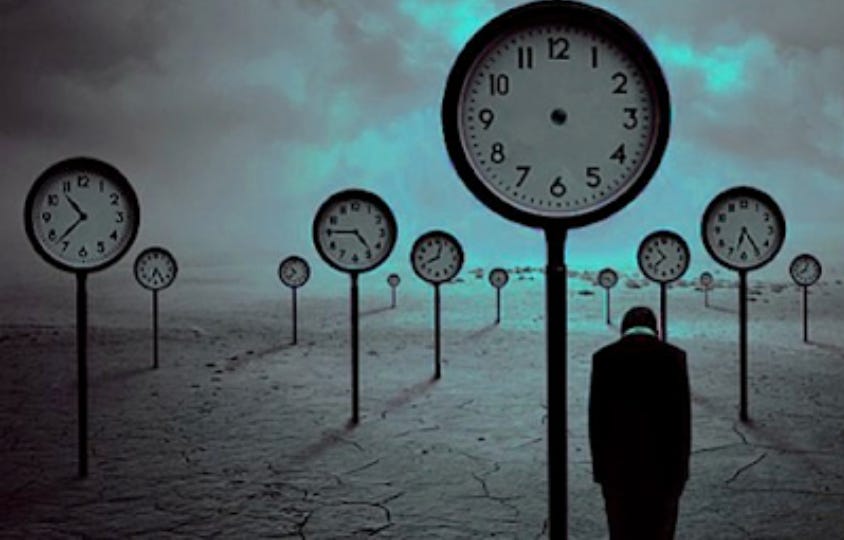

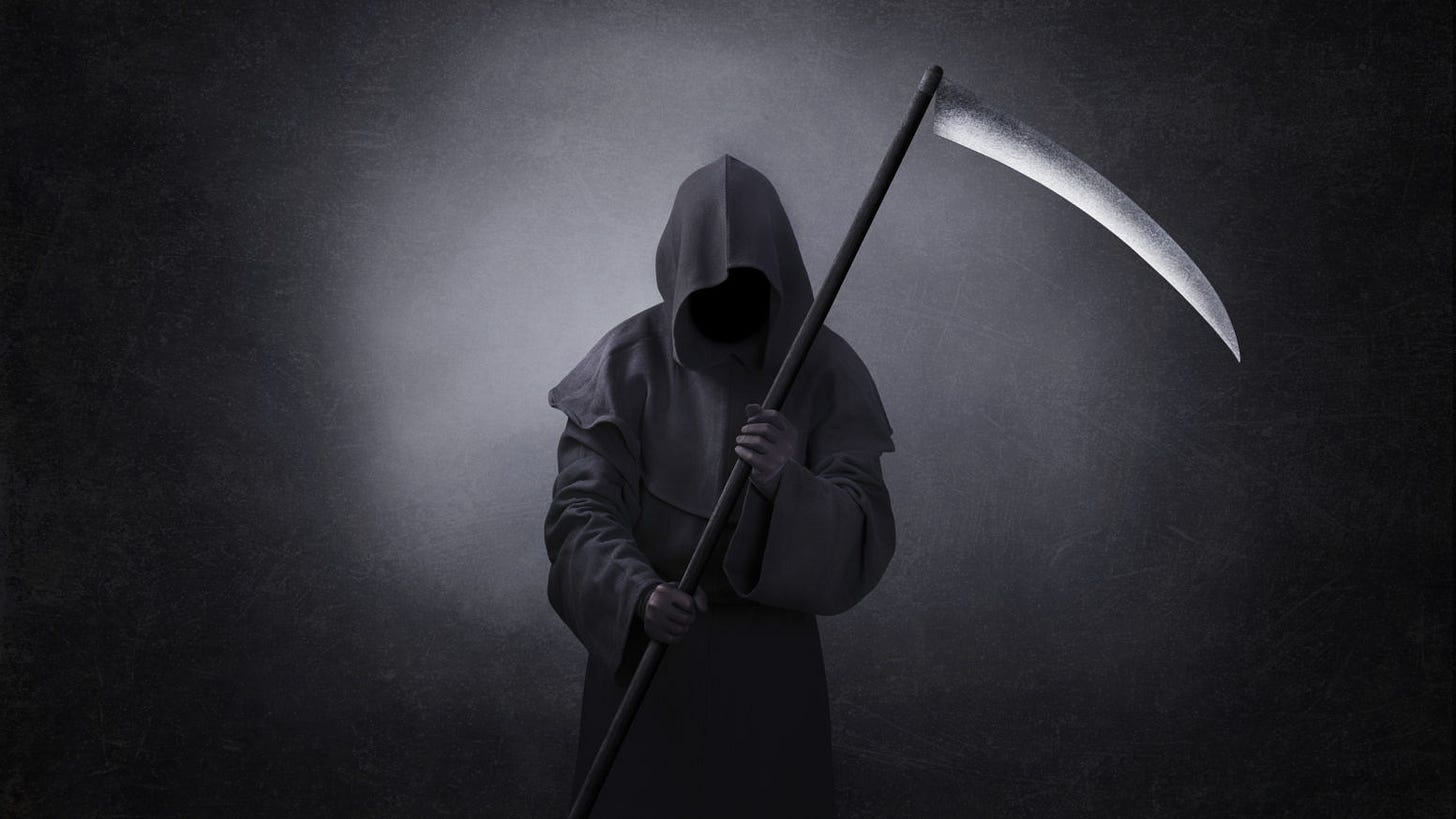
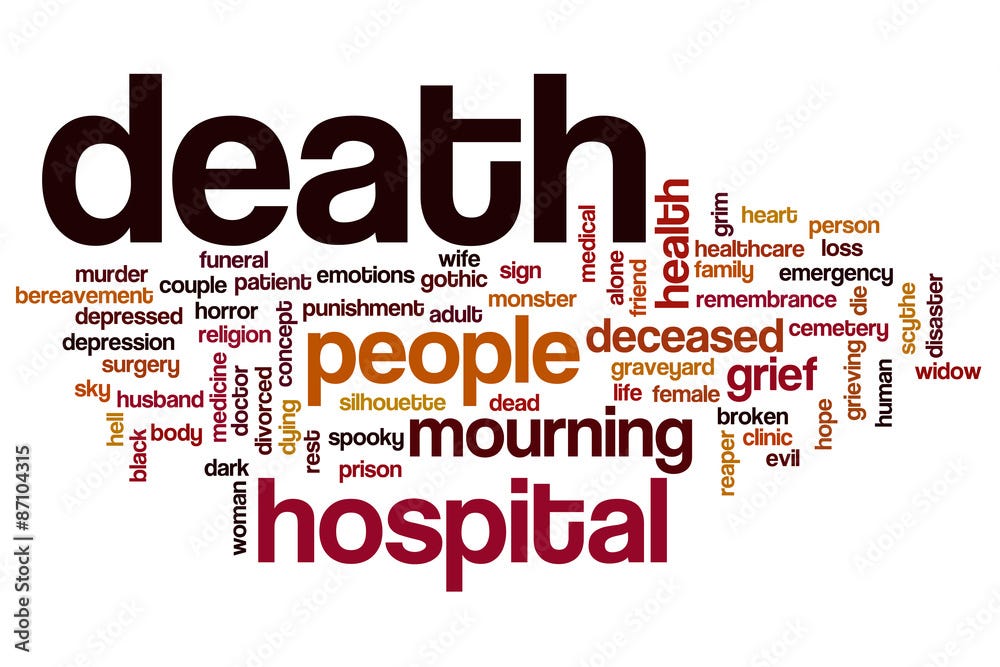

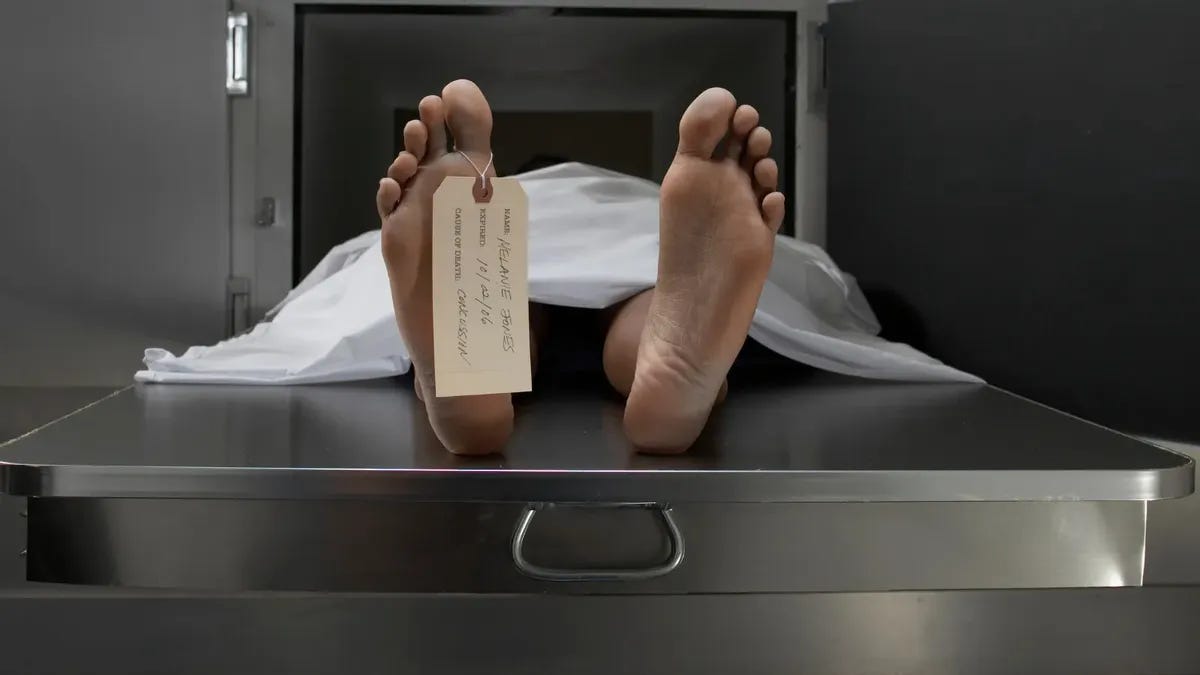
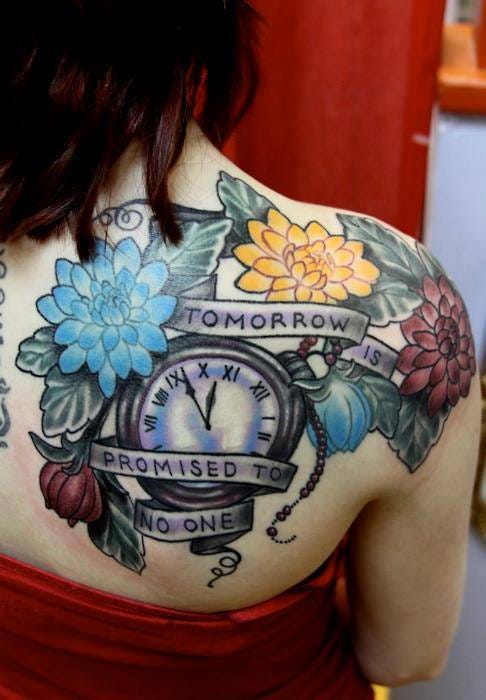


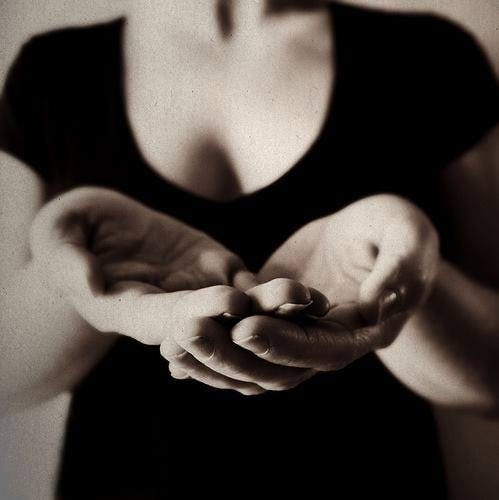
Jim I am grateful for your sharing of hope and knowledge. This article was written at the most fortuitous time. My beloved brother in law passed on March 15th early in the morning. I have read all that I could find on death and dying for at least 50 years now. I am certified as an end of life doula. I can honestly say I feel no animosity toward death. My brother in law had lung cancer and suffered through the treatments. I spoke with him 2 days before he passed and asked if he was afraid, did he remember ever having done this before. He was not afraid and indeed he seemed familiar with process. I told him he would know what to do and to relax and not worry about his wife, we would take care of her. He died so lovingly and peacefully it was an honor to have known him. Keep writing about the truly important things in life, Jim. We need your wisdom and guidance at these most meaningful times in life. Also substack is worth every penny!
It was such a joy chatting with and learning from you! I am so grateful for your writing.